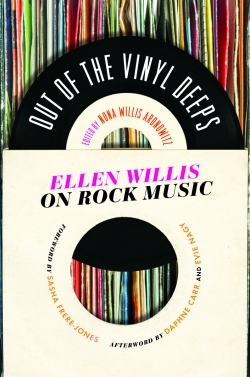Out of the Vinyl Deeps
Ellen Willis on Rock Music
The generations that came of age in the 1960s and 1970s had a wide variety of publications, both fan-based and professional, in which to follow the activities of their favorite musicians. Rolling Stone, Crawdaddy, Creem, and Transoceanic Trouser Press are just a few of the vehicles that attracted writers covering the rock music scene and anything peripheral to it, which included politics and fashion. The most well-known names among rock journalists have long been those of men: Robert Christgau, Greil Marcus, Lester Bangs, and Dave Marsh. But there was a woman who wrote insightful, engaging rock criticism for the New Yorker from 1968 to the 1980s. After she moved away from that field, her essays and reviews faded from whatever notice they’d received when they were published.
Editor Nona Willis Aronowitz has corrected this problem with this collection of her mother Ellen Willis’s articles from the New Yorker and other sources. Willis was hired to write critically about popular music, and she did so by placing the musicians and their music in their times and concentrating on her personal favorites. In this way, Willis added the thoughtful fan’s reaction to the critic’s examination, something that was less prominent in the work of her male peers of the time. Bangs and Marsh were all about the crazy approach, Christgau and Marcus were as seriously highbrow as a rock critic could get; and while they all had the love of the music as their critical foundation, Willis wrote from her direct response to the music based on what came before it and what the world looked like when the musician released it to the world.
Bob Dylan was the center of Willis’s musical universe for many years, but she also had time for the Beatles, the Rolling Stones, Janis Joplin, David Bowie, Van Morrison, Joni Mitchell, Bette Midler, and many others. Her tastes were eclectic and her eye true when it came to examining a record: working from the perspective of both the critic and the fan gave Willis the latitude to feel the music as well as hear it. The fact that she could translate those feelings into coherent examinations in words is no mean feat. Joni Mitchell’s Blue garnered this from Willis: “I had always liked her but we never really connected…Then came Blue. What hit me first was that the freaky voice had found its purpose.”
There are probably a lot of people who grew up while Willis was writing for the New Yorker who’ve never heard of her. Out of the Vinyl Deeps belongs on the bookshelf of every library as proof that women could and did—and do—rock, and can write intelligently and entertainingly about it.
Reviewed by
J. G. Stinson
Disclosure: This article is not an endorsement, but a review. The publisher of this book provided free copies of the book to have their book reviewed by a professional reviewer. No fee was paid by the publisher for this review. Foreword Reviews only recommends books that we love. Foreword Magazine, Inc. is disclosing this in accordance with the Federal Trade Commission’s 16 CFR, Part 255.

